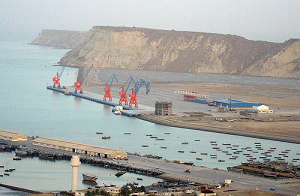China – Pakistan Economic Corridor: An Opportunity for Central Asia?
By Fuad Shahbazov
June 19, 2017, the CACI Analyst
In May 2017, China hosted an international summit in Beijing gathering 28 heads of state from four continents and representatives of various international organizations. The summit was devoted to the Belt and Road Initiative, referring to overland and maritime routes across the Eurasian landmass. One of the most significant moments of the summit was the meeting between China’s and Pakistan’s leaders and the signing of a new agreement (MoU), adding to the US$ 46 billion already pledged for the China-Pakistan Economic Corridor (CPEC), a network of rail, road and energy infrastructure. During the event, Pakistan’s Prime Minister Nawaz Sharif met with the leaders of Kazakhstan, Uzbekistan, and Kyrgyzstan, requesting their investment in CPEC.
The China-Pakistan Economic Corridor Between Hope and Fear
By Mushtaq A. Kaw
April 26, 2017, the CACI Analyst
In December 2016, China’s Ambassador to Pakistan, Zhao Lijian, stated that “CPEC is working well” with the support of the Pakistani people, notwithstanding certain opposition. The statement is characteristic of China’s and Pakistan’s praise for the China-Pakistan Economic Corridor (CPEC) as a game changer for their respective economies and regional connectivity. Yet in reality, the project faces a variety of intricate economic challenges as well as security threats. Its success will therefore depend upon an inclusive, balanced and sustained China-Pakistan approach towards the forces hostile to the project. Even then, the project will have various geopolitical, geo-economic and geo-strategic implications for the region and the world.

Turkmenistan advances westward natural gas export
By Natalia Konarzewska
March 25th, 2016, The CACI Analyst
In late December 2015, Turkmenistan officially announced the completion of the East-West gas pipeline. This 773 kilometer route with an annual capacity of 30 billion cubic meters (bcm) will connect natural gas from fields located in eastern Turkmenistan to those along its Caspian Sea coast, with the potential of further transfer via the Caspian Sea and onward to the Turkish and European markets. The construction of the pipeline is complementary to Turkmenistan’s current strategy for gas exports. Ashgabat seeks broader export opportunities in Turkey and Europe to reduce its dependence on Russia and China as major gas export outlets. However, despite positive political shifts, which might enhance Turkmenistan’s energy cooperation with Turkey, Azerbaijan and the EU, several obstacles remain to the westward transfer of Turkmenistan’s gas.





